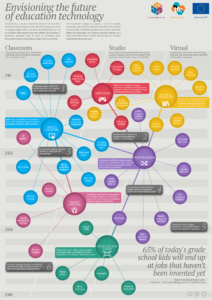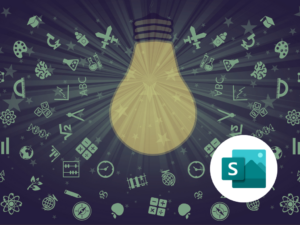In Australia, and indeed the rest of the world, the future of education is being hotly debated.
It seems like everyone from bureaucrats, to teachers and even parents and community members all have an opinion on what the future of education will look like in the next twenty years. Yet looking at the future of education is not a simple discussion to have.
Education has always sat within the tension of teaching students skills they need in their immediate world, yet also train our students for a future that has not yet been created.
The authors say it best:
Education lies at a peculiar crossroad in society. On one hand it has the responsibility of anticipating real-life skills by preparing us for an increasingly complex world – but education methodologies can only be formalized after practices have been defined. This dichotomy is particularly aggravated when it comes to technology, where fast-paced innovation and perpetual change is the only constant.
There are often statistics and quotes thrown around such as “65% of school students will work in jobs that haven’t been created yet” (See the info-graphic)
Whether or not these statistics are true is largely irrelevant. Even if 20% of students will be working in jobs not yet created, that is a large enough percentage of the student population to cause us to wonder what the future of education might look like and how as teachers we must adapt to the change.
The following info-graphic on the future of education technology gives us a few suggestions.
Last week I posted another info-graphic predicting what role technology will play in our future. It highlighted industries such as space tourism, virtual farming etc.
We are already beginning to see some of the futuristic technology that will be used in these industries beginning to emerge in the classroom. We have (to name just a few):
- Augmented reality
- Immediate collaboration between individuals around the globe
- Virtual field trips
- 3D visualisation to enhance learning
- Digitised textbooks and paperless classrooms
The authors also seem to predict a radical shift in the way lessons are delivered. You will notice that the authors predict that as we head into the next couple of decades that the virtual classroom will become more common.
This leaves me asking a few questions such as:
- Will students still gather to learn in community or will they learn in isolation?
- If they are still coming to school to learn, who will monitor their behaviour and progress?
- Will teachers begin to specialise? Rather than working in one school teaching a range of subjects within a department will they specialise to one particular subject but work with students from within a district or further abroad?
- If school become less populated, what will they do with all the real estate tied up in school property?
When we start to envisage the future of education it seems that there will be more problems and answers.
This situation is exacerbated because the educational sector is renowned for resisting change. It has been said that in education, it takes fifty years for new practices to become accepted as the norm. With this in mind the challenge will be how do schools keep up with the pace of change in society which is largely driven by advances in technology.











